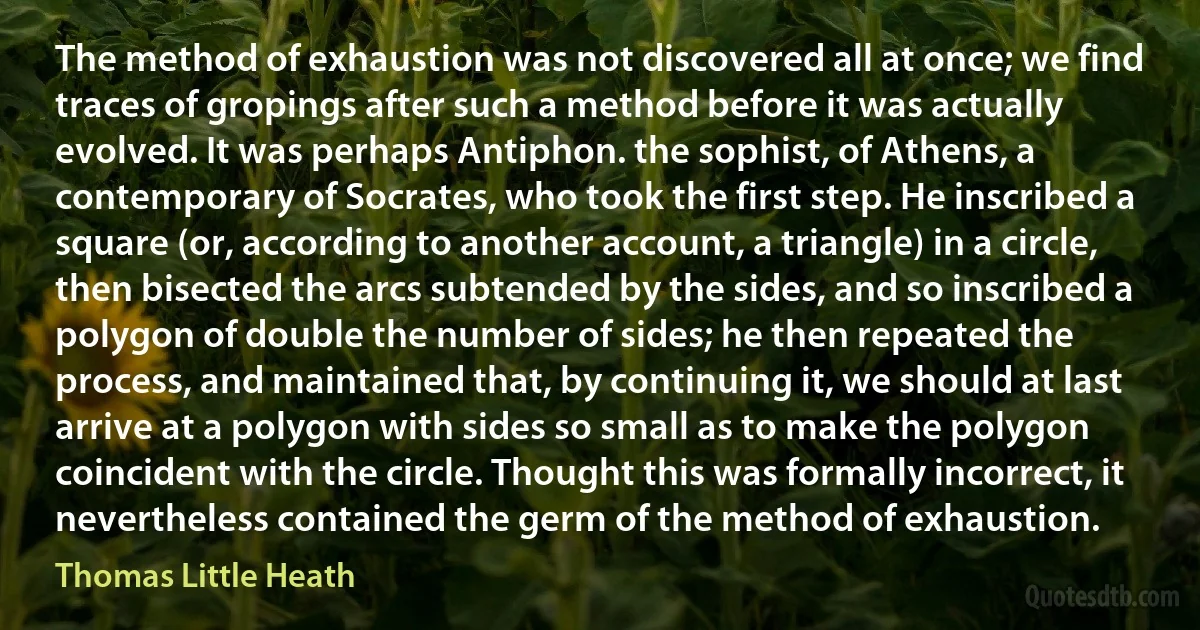
The method of exhaustion was not discovered all at once; we find traces of gropings after such a method before it was actually evolved. It was perhaps Antiphon. the sophist, of Athens, a contemporary of Socrates, who took the first step. He inscribed a square (or, according to another account, a triangle) in a circle, then bisected the arcs subtended by the sides, and so inscribed a polygon of double the number of sides; he then repeated the process, and maintained that, by continuing it, we should at last arrive at a polygon with sides so small as to make the polygon coincident with the circle. Thought this was formally incorrect, it nevertheless contained the germ of the method of exhaustion.
Thomas Little HeathRelated topics
account arrive contemporary double exhaustion find germ incorrect last number once perhaps should small sophist square step take thought triangle socratesRelated quotes
The classic instrument to measure drawn angles and to draw angles of a given measure is the protractor - essentially half a circular ring, subdivided by ray segments into 180 degrees. For reasons I was unable to find out, this instrument has recently been superseded by an isosceles right triangle - called geo-triangle, solid, transparant, made of plastic - with an angular division radiating from the midpoint of the hypotenuse to the other sides. Well, inside the triangle half a circle with the midpoint of the hypotenuse as its centre is indicated, and from the position of the degree numbers it becomes clear that it is the semicircle that really matters. One is inclined to say "an outrageously misleading instrument"...

Hans Freudenthal
What are the rewards of the tiny, ingrown, biological family opposing its closed circle of affection to a forbidding world of the strong ties between parent and children, ties which an active personal relation from birth until death?... Perhaps these are too heavy prices to pay for a specialization of emotions which might be bought about the other ways, notable through coeducation. And with such a question in our minds its interesting to note that a larger family community, in which there are several adult men and women, seems to ensure the child against the development of the crippling attitudes which have been labelled Oedipus complexes, the Electra complexes, and so on.

Margaret Mead
The individualistic conception of the State as some external authority exercising a malign influence upon the life of the community is a travesty of fact. The State is that form of organised society which has evolved through the process of the ages, and represents the aptitude for freedom and self-government to which any people has attained. The policeman and the soldier, for example, who are at the call of the landlord or the employer when tenant or workman becomes turbulent, exist by the will and under the express authority of those same tenants and workmen, who constitute a preponderating majority in the State, and without whose consent neither soldier nor policeman could continue to exist.

Keir Hardie
A common monetary standard will be established, with the consent of the various governments, by which industrial transactions will be greatly facilitated. Three spheres made respectively of gold, silver, and platinum, and each weighing fifty grammes, would differ sufficiently in value for the purpose. The sphere should have a small flattened base, and on the great circle parallel to it the Positivist motto would be inscribed. At the pole would be the image of the immortal Charlemagne, the founder of the Western Republic, and round the image his name would be engraved, in its Latin form, Carolus; that name, respected as it is by all nations of Europe alike, would be the common appellation of the universal monetary standard.

Auguste Comte
Dinosaurs are not lizards, and vice versa. Lizards are scaley reptiles of an ancient bloodline. The oldest lizards antedate the earliest dinosaurs by a full thirty million years. A few large lizards, such as the man-eating Komodo dragon, have been called "relicts of the dinosaur age", but this phrase is historically incorrect. No lizard ever evolved the birdlike characteristics peculiar to each and every dinosaur. A big lizard never resembled a small dinosaur except for a few inconsequential details of the teeth. Lizards never walk with the erect, long-striding gait that distinguishes the dinosaurlike ground birds today or the birdlike dinosaurs of the Mesozoic.

Robert T. Bakker
